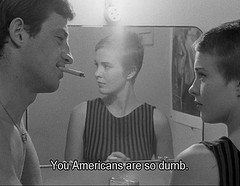Blowing Smoke: How Much Should One Pay For Cigarettes

One of my closest friends growing up was much cooler than I was: he was handsome and confident and had both a sense of humor and a dark side. (We were friends in part because we bonded before he went through puberty and became High School’s Most Wanted.) Of course I was in the kind of love with him that expressed itself in Dorothy Parker-esque poetry. Of course, in melodramatic moments, I called myself “Eponine.” But though he was swoon-worthy, and I did a lot of swooning, if he put a cigarette in his mouth around me, I would yank it out again and throw it away.
I’m sure that was irritating then; after all, for all his charm, he didn’t have money to spare. It might be a friendship-ending offense now. Anytime I take notice of cigarette prices in New York City now, I am struck by how incredibly expensive they are. As anti-tobacco as I am, even I feel uneasy about this strategy.
And, as the Village Voice reports in an absorbing #Longread, taxing cigarettes to high heaven isn’t an unalloyed good for NYC, either. It has turned smuggling into serious business.
By law, the minimum price for a pack of premium-brand cigarettes in New York City is $10.50, but averages are closer to $12.50. For a pack-a-day smoker, that adds up to about $375 per month. But out-of-state cigarettes — like the ones for sale at the corner store in Long Island City — typically go for $7 or $8. A smoker with steady access to untaxed cigarettes could save as much as $210 a month. And because one can legally possess up to two such cartons for personal use, a smoker with the odd out-of-state pack is immune from any penalties at all. In other words, the end users who actually buy the illegal cigarettes aren’t breaking any laws.
The bodega owners who sell out-of-state cigarettes are breaking laws, though. They have to deal with the consequences. So do the city and the state.
the smuggling problem in New York is now the worst in the country. While states like Michigan and Massachusetts have some activity, according to the National Research Council and the Institute of Medicine, New York accounts for about half of tax losses nationwide. In dollar figures, the best estimates suggest that New York loses about $1.5 billion in revenue every year to tobacco tax evasion in its various forms.
This is sort of a mind-boggling figure. By comparison, New York City’s Department of Homeless Services spends just under $1 billion per year. You could fund New York City’s entire Parks and Recreation budget nearly four times over with the money lost to untaxed smokes.
Reason Magazine calls NYC’s cigarette taxes “laughably high” and points out that they’re causing trouble not merely locally but down south as well, because when smugglers go to Virginia to buy cartons in bulk, they often do so wholesale and avoid taxes in both jurisdictions.
The Wall Street Journal points out that raising taxes on tobacco seems like a great idea but usually doesn’t work in practice.
Most of the cigarettes smoked in New York, 58%, are smuggled in from out of state, according to the nonpartisan Tax Foundation. The higher that revenue-hungry politicians raise tobacco taxes, the more profit smugglers can make.
This is a large part of the reason that revenue from increases in cigarette taxes often falls short of expectations. Washington, D.C., experienced this firsthand after cigarette taxes were raised by 25%, to $2.50 per pack from $2, in October 2009. City leaders claimed the hike would generate a windfall of additional revenue. By February of 2010, D.C.’s chief financial officer reported that projections were off by $15 million. Revenue from the cigarette tax actually fell by $7 million after the hike.
Part of the issue is that people who smoke — more precisely, those who despite government educational efforts, still smoke — are, on average, less able to afford $12 or $14 a pack.
The Federal Reserve Bank of Atlanta reports that the average smoker earns an average annual income of $27,248, 17% less than the average nonsmoker. Hence high tobacco taxes inevitably induce some low-income smokers to turn to black markets, where they can buy cigarettes at a fraction of the price.
Should Eastern Seaboard states get together and agree on a standard tax? That would cut down on smuggling as well as costly anti-smuggling efforts. Sure, it’s hard to imagine Virginia and New York agreeing, but it might help them both save money in the long run. And, considering that the government does have a vested interest in maintaining a relatively healthy populace, and in generating revenue from commerce, what would be a fair price for cigarettes?
Support The Billfold
The Billfold continues to exist thanks to support from our readers. Help us continue to do our work by making a monthly pledge on Patreon or a one-time-only contribution through PayPal.
Comments